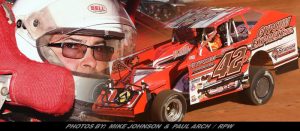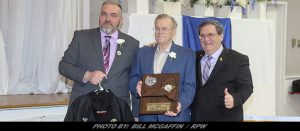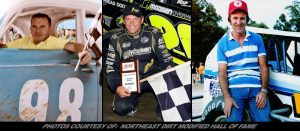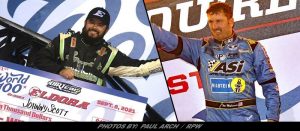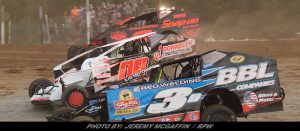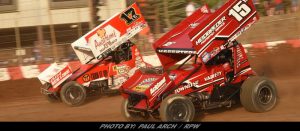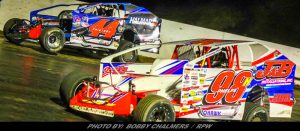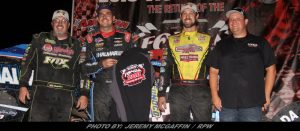Danny Johnson, Pat O’Brien & Ray Brown The 2019 Class Of The NE Dirt Modified Hall Of Fame
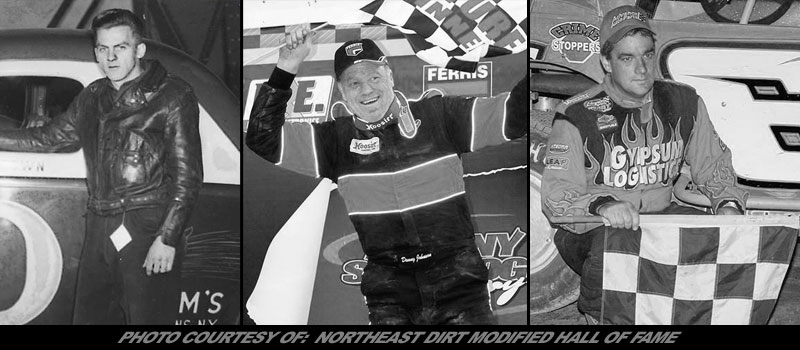
Story By: BUFFY SWANSON / NORTHEAST DIRT MODIFIED HALL OF FAME – WEEDSPORT, NY – Long-feared DIRTcar heavyweight Danny Johnson, North Country warrior Pat O’Brien and diverse 1950s pioneer driver Ray Brown will officially be inducted into the Northeast Dirt Modified Hall of Fame in July.
These three racing greats add their names to a stellar list of Modified standouts that was started in 1992 when the Hall of Fame was established on the Cayuga County Fairgrounds in Weedsport, NY.
The 28th annual induction ceremonies honoring the Class of 2019 will take place Thursday, July 25 at 7 pm in the Northeast Dirt Modified Museum and Hall of Fame, on the grounds of the beautifully reimagined Weedsport Speedway. The event is free and open to the public, and will feature pre- and post-program festivities. The following Sunday, Weedsport Speedway will present its Super DIRTcar Series Hall of Fame 100 for the big-block Modifieds.
It took a couple of seasons for second-generation pro Danny Johnson to kick it into high gear — and he’s remained in overdrive ever since. After notching his first Mod victory in 1979 at age 19, the racer from Phelps, NY, emphatically served notice that he was a dead-serious threat in 1983, scoring five Super DIRT Series victories that season. It’s been full speed ahead ever since: Danny’s never-say-die attitude and innate ability to carry a car have earned him four overall Mr. DIRT Modified titles, three SDS trophies, five championships at Rolling Wheels, four at Canandaigua, two at Weedsport, three on the Florida tour, and 89 SDS wins. He’s been equally effective in the 358 Mod ranks, with four Mr. DIRT 358 and three series titles, championships at Ransomville, Orange County and Weedsport, and 56 358 series scores. He’s won six Eastern States 200 classics, another five in the 358 event, a trio of Lebanon Valley 200s, and, at the top of the heap, the big ones at Syracuse — two SDW Mod triumphs (in 1997 and ’06) and another pair of SDW 358 events. Johnson’s current win list stands at 593, with victories for 40 different car owners at 55 tracks in 13 states and two Canadian provinces. That 55 track stat is a tour de force: No other driver in the modern era of Modified racing has reached that record.
His father was the original “Flyin’ O’Brien,” but Canadian Pat O’Brien climbed into the cockpit to assume the nickname and keep the family flag soaring. The Kingston, Ontario, native followed his dad into the sport in 1985, fielding a home-built small-block Mod at places like Brockville, Cornwall, Can-Am and Brighton. Competing primarily in the 358 ranks, O’Brien found himself pitted against the “big boys” — Brett Hearn, Pete Bicknell, Steve Paine, the Johnsons — when the series races came to town. In true “David vs. Goliath” fashion, Pat held his own against DIRT’s best: He has won four Mr. DIRT 358 tour titles, more than any other driver in the course of the series. When O’Brien retired at the end of the 2016 season, he’d won 176 races at seven speedways in two countries, eight championships split between Cornwall and Brockville, two at Mohawk, one at Thunder Alley, and a remarkable 10 titles at Can-Am where he is the winningest driver in track history.
Pioneer Ray Brown, Orange County Fair Speedway’s first stock car superstar, put his name on the Modified map at the tail end of the 1940s, racing at tracks no longer in existence: Kingsbridge Armory in the Bronx; downstate New York facilities like Empire, Peekskill, Arlington and others. But it was at OCFS in Middletown that the driver from White Plains made an indelible mark. Winning his first of 43 features there on July 4, 1951, Brown raced the stock cars through 1959, claiming three Mod championships in 1952, ’53 and ’57 and finishing runner-up in two other seasons during that nine-year period. In New Jersey, he only ran at Old Bridge Stadium for two years (1953 and ’54) — during which he won 15 times and was crowned the track’s first champion. In the 1960s, Ray made the switch from stock cars to Midgets, restarting his career as a star with ARDC, winning 27 club events at Williams Grove, Old Bridge and, of course, Orange County. Brown retired from racing in 1967, following a motorcycle accident that mangled one of his legs. He died in 1989 at age 65.
Also being honored at the July 25 induction ceremonies are Lucky Jordan, Howard Conkey, Jerry Fried, Mel Thomas, JoAnne Chadwick and Warren Ruffner.
The 2019 Gene DeWitt Car Owner Award goes to Lester “Lucky” Jordan, a North Carolina transplant who settled in South Jersey in the late 1940s, establishing a garage there in Riverton. From that spartan shop, Lucky built a bunch of winners — never comely, always quick — that broke the mold, experimenting with aerodynamic wings and “hidden” fuel injection before anyone else ever dared. Jordan’s roster of drivers looks like a Hall of Fame cheat sheet: Al Tasnady, Budd Olsen, Rags Carter, Bobby Pickell all drove for Lucky. Will Cagle’s first good Northern ride was in the infamous Jordan Deuce. They all won — and some won big — for Lucky, with Tasnady taking eight of 12 features and the title at Dover, NJ, in ’54 and Pickell grabbing 19 checkers from 1964-66. But Lucky enjoyed his most success when Jackie McLaughlin occupied the seat. In 1962, Jordan and Jackie won 29 features at Flemington, Nazareth, Georgetown and the Allentown Fairgrounds. They went 10 for 12 in the month of June, and were 13 for 15 in July of that year. In 1968, Jordan sold his stable and, for a couple of years, his services as a mechanic to car owner Dick Cozze. Lucky Jordan passed away in 1991.
Howard Conkey, recipient of this year’s Mechanic/Engineering Award, could certainly be called the “mad scientist” of Modified racing. Conkey began building exotic street cars out of his Show Car Engineering shop in Waterloo, NY, in 1969. The lure to do something different led him to dabble in dirt Modifieds: Even before the shop opened, he’d built a hot rod driven by Hall of Famer John McArdell that won a bunch of races. Howard’s germ of an idea to offset the chassis became full-blown in 1971, when he built a radically offset car for Chuck Ciprich — a ’37 Chevy coupe christened “Old Yeller” — that won 10 in a row. Always tinkering, Conkey played with offsets, engine setbacks, cantilever suspensions, wheel widths and cross-over engineering data from Supermodifieds he was also fabricating. Alan Johnson’s notorious switch from a proven Troyer to an untried Show Car design in 1983 resulted in A.J. winning everything in sight (including Syracuse) and pushed Show Car’s stock through the roof. Unfortunately, the manic genius was not an “assembly line” kind of guy — Conkey never wanted to build the same car; he was only interested in constructing something new and better, a business model that didn’t work. In 1989, a fire decimated the speed shop. During the rebuilding, Conkey was diagnosed with cancer. He died in 1993; Howard was 54 years old.
The late Pennsy promoter Jerry Fried will receive the prestigious Leonard J. Sammons Jr. Award for Outstanding Contributions to Auto Racing. The Bronx-born Fried came from a world far removed from dirt-track auto racing: He was a dapper ballroom-dancing impresario, managing venues in NYC in the 1940s. Landing incongruously in Nazareth, PA, in 1952, Jerry first promoted, then purchased the fairgrounds speedway. With the showmanship that served him well in dance halls, the besuited Fried put a spit-polish shine on Sunday night promotions, renovating the physical facility and effectively publicizing the racing program. By 1956, Nazareth’s pits were overflowing with the region’s best racers, in large part because Fried was offering a guaranteed purse rather than a percentage of the gate. Ten years after taking over Nazareth, Jerry added the fifth-mile Dorney Park asphalt oval to his holdings. But his dream track was the 1-1/8-mile dirt Nazareth National Speedway, which Fried built in 1966 on 98 acres just south of his half-mile clay track. Some 50 races were staged at NNS under Jerry Fried’s direction until financial shortfalls caused him to close down the big track in 1971. He continued to promote the half-mile until 1987, leasing the facility to the Cozze family for its final season, in 1988. Fried passed away at age 73 the following year.
Videographer Mel Thomas, Geneva, NY, is the recipient of the Andrew S. Fusco Award for Media Excellence, in memory of Hall of Fame board member and legal counsel Andy Fusco. Following his discharge from the U.S. Navy in the mid ’70s, Thomas turned his childhood fascination with auto racing into a weekly CNY radio program. Video was the next logical step. Mel had studied A/V communications at the local community college — so when promoter Glenn Donnelly wanted to showcase DIRT racing on TV, he knew who to call. In addition to shooting weekly events, Thomas was a producer, cameraman and editor for “This Week on DIRT,” a popular feature on cable TV, working closely with on-air personality Andy Fusco to engineer the first two-camera production of Super DIRT Week in 1979. Son Matt and grandson A.J. now work alongside Mel at Thomas Video Productions. Their latest venture is Raceflix, a subscription-based offering of racing videos from past and present. In addition to a video-cam, Mel also held a mic and a pen, announcing at tracks throughout the area and writing for Speedway Scene and the Finger Lakes Times.
JoAnne Chadwick, former GM and co-promoter of Orange County Fair Speedway, will be honored with the Outstanding Woman in Racing Award. Chadwick had casually attended the nearby Middletown track as a teenager — but it turned into serious business in 1983 when her cousin, DIRT guru Glenn Donnelly, assumed management of the operation. Initially, JoAnne and her husband, Gary, were called on to take over production and sales of the weekly speedway program. But soon, DIRT GM Robin Manus needed more help in the office, and JoAnne stepped up to handle bookkeeping and paperwork. She worked with Manus, then incoming GM Will Cagle, before going on a brief maternity leave in 1987. Upon her return, Chadwick’s role kept expanding: By 2000, she was managing the track’s day-to-day operations; in 2001, she was elevated to GM. For 2005, the year after Donnelly sold DIRT to World Racing Group, she was named co-promoter with Cory Reed. Her final season at OCFS was 2006. All that time, JoAnne continued to produce the program, and also served as controller Howard Commander’s right-hand finance whiz each year at Super DIRT Week.
The Jack Burgess Memorial Award, periodically bestowed on an announcer who has made a lasting impact on the sport, will be presented to the family of the late Warren Ruffner, the iconic voice of the Reading Fairgrounds. A radio advertising and real-estate salesman by trade, Ruffner’s skills at the microphone found him branching out into local radio and television work. In the early 1960s, he hosted the weekly Reading Fairgrounds program on WPHL-TV in Philadelphia. He also called the IMCA Florida Sprint Car Nationals from Tampa for ABC’s “Wide World of Sports” and reported USAC championship racing action on NBC radio. But Warren is best remembered as the man who thrilled the fans from his perch in the tower at the old Reading Fairgrounds. He loved racing as much as they did. After Reading closed in 1979, Ruffner went on to announce at Penn National, Williams Grove, Big Diamond and Bridgeport speedways, and at major events at Pocono Raceway and the New York State Fairgrounds in Syracuse. We lost Warren Ruffner on January 8, 2011.


